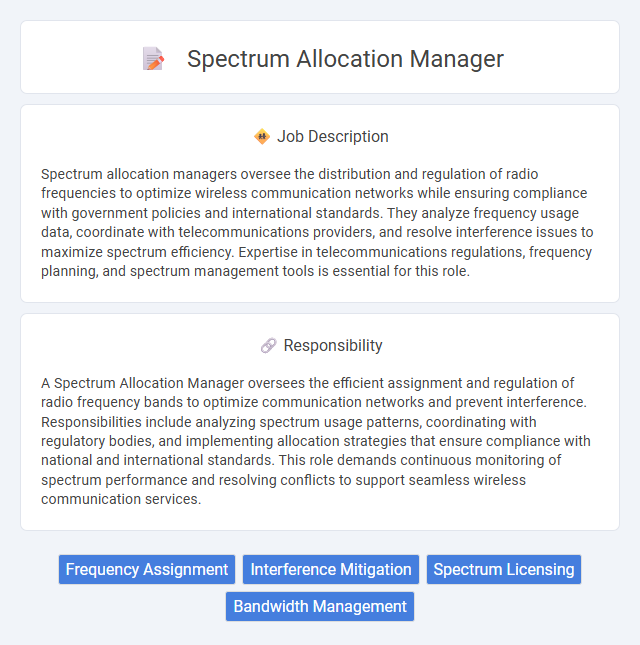
Spectrum allocation managers oversee the distribution and regulation of radio frequencies to optimize wireless communication networks while ensuring compliance with government policies and international standards. They analyze frequency usage data, coordinate with telecommunications providers, and resolve interference issues to maximize spectrum efficiency. Expertise in telecommunications regulations, frequency planning, and spectrum management tools is essential for this role.
Individuals with strong analytical skills and a keen attention to detail are likely to thrive as Spectrum Allocation Managers, as the role demands precise frequency management and regulatory compliance. Those who exhibit problem-solving capabilities and can navigate complex technical data may find the job well-suited to their abilities. Conversely, people who struggle with multitasking or lack interest in telecommunications infrastructure might face challenges in adapting to the position's requirements.
Qualification
A Spectrum Allocation Manager typically requires a Bachelor's degree in telecommunications, electrical engineering, or a related field, with advanced certifications in spectrum management or wireless communications preferred. Proven experience in regulatory compliance, frequency planning, and radio frequency engineering is essential to effectively oversee spectrum allocation processes. Strong analytical skills and proficiency with spectrum analysis tools support optimal utilization and conflict resolution across communication networks.
Responsibility
A Spectrum Allocation Manager oversees the efficient assignment and regulation of radio frequency bands to optimize communication networks and prevent interference. Responsibilities include analyzing spectrum usage patterns, coordinating with regulatory bodies, and implementing allocation strategies that ensure compliance with national and international standards. This role demands continuous monitoring of spectrum performance and resolving conflicts to support seamless wireless communication services.
Benefit
Spectrum allocation managers likely ensure optimal distribution of radio frequencies, potentially reducing interference and maximizing communication efficiency. They may facilitate better connectivity for telecommunications and broadcasting, increasing network reliability. Their role probably enhances regulatory compliance, helping organizations avoid costly penalties and improve service quality.
Challenge
The Spectrum Allocation Manager role likely involves navigating complex regulatory environments and balancing competing demands for limited frequency resources. Managing spectrum allocation may require careful consideration of technological advancements and evolving industry standards, presenting continuous strategic challenges. The position probably demands strong analytical skills to optimize spectrum efficiency while minimizing interference and ensuring compliance with legal frameworks.
Career Advancement
A Spectrum Allocation Manager plays a crucial role in optimizing the use of radio frequencies to support telecommunications, broadcasting, and emergency services, making this position pivotal for national and global connectivity. Career advancement opportunities in this field often lead to senior roles such as Regulatory Affairs Director, Spectrum Policy Advisor, or Head of Wireless Communications, leveraging expertise in frequency management and compliance with international standards. Professionals can enhance their career trajectory by acquiring certifications in telecommunications regulation, participating in international frequency coordination forums, and gaining experience with emerging technologies like 5G and IoT spectrum allocation.
Key Terms
Frequency Assignment
A Spectrum Allocation Manager specializing in Frequency Assignment is responsible for coordinating and allocating radio frequency bands to ensure optimal use of the electromagnetic spectrum. This role involves analyzing frequency requirements, mitigating interference, and complying with regulatory policies set by telecommunications authorities such as the FCC or ITU. Effective frequency assignment supports efficient wireless communication networks, enhances spectrum efficiency, and prevents signal conflicts in diverse applications including mobile, satellite, and public safety communications.
Interference Mitigation
A Spectrum Allocation Manager specializes in optimizing frequency distribution to reduce signal interference across communication networks. Utilizing advanced algorithms and real-time data analysis, they implement interference mitigation strategies that enhance spectrum efficiency and ensure compliance with regulatory standards. Their expertise supports seamless wireless connectivity by minimizing cross-channel disruptions and optimizing spectrum utilization.
Spectrum Licensing
Spectrum allocation managers oversee the distribution and licensing of radio frequencies to ensure efficient use and regulatory compliance. They analyze spectrum availability, coordinate with government agencies, and manage licensing processes for telecommunications, broadcasting, and wireless services. Expertise in regulatory frameworks and spectrum management software is essential for optimizing frequency utilization and minimizing interference.
Bandwidth Management
Spectrum allocation managers oversee the efficient distribution and utilization of radio frequencies to maximize bandwidth management, ensuring minimal interference and optimal communication quality. They analyze frequency usage patterns and implement policies that balance regulatory compliance with technological demands, improving network performance across various sectors. Expertise in spectrum monitoring tools and knowledge of international regulatory frameworks is critical for managing limited spectrum resources effectively.
 kuljobs.com
kuljobs.com